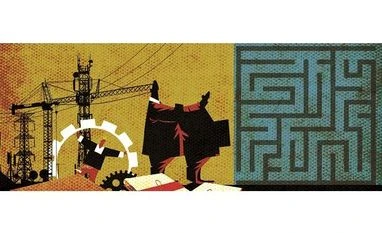Seven states, including Andhra Pradesh and Gujarat, have emerged as the “top achievers” in the government’s latest feedback-based survey to recognise and identify the exemplary reform measures undertaken by the states and Union Territories to improve the business environment.
The latest fifth edition of the Business Reforms Action Plan (BRAP), 2020, by the industry department did not rank states on the ease of doing business measures undertaken by them and categorised them into categories such as top achievers, achievers, aspirers and emerging business ecosystems. The other top achievers include Haryana, Karnataka, Punjab, Tamil Nadu and Telangana.
In BRAP, 2019, released in September 2020, Andhra Pradesh, Uttar Pradesh and Telangana were the highest rank holders.
In the latest edition, Himachal Pradesh, Madhya Pradesh, Maharashtra, Odisha, Uttarakhand, and Uttar Pradesh figure under the ‘Achievers’ category. While Assam, Chhattisgarh, Goa, Jharkhand, Kerala, Rajasthan and West Bengal have been placed in the ‘Aspirers’ category, Andaman & Nicobar, Bihar, Chandigarh, Daman & Diu, Dadra & Nagar Haveli, Delhi, Jammu & Kashmir, Manipur, Meghalaya, Nagaland, Puducherry and Tripura have been clubbed under the ‘Emerging Business Ecosystems’ category.
“The objective of assessing the states/UTs is not to create a hierarchy amongst states/UTs but to rather create an enabling framework wherein learnings can be shared amongst States/UTs which in turn will lead to a nationwide spill over of good practices. The assessment gives full weightage to the feedback obtained from actual users/respondents at the ground level, who provided their feedback about the effective implementation of reforms,” the industry department said in a statement.
The BRAP 2020 includes 301 reform points covering 15 business regulatory areas, such as access to information, single window system, labour, environment, land administration and transfer of land and property, utility permits and others. A total of 118 new reforms were included to further augment the reform process. Sectoral reforms with 72 action points spread across nine sectors namely trade license, health care, legal metrology, cinema halls, hospitality, fire NOC, telecom, movie shooting and tourism were introduced for the first time to expand the scope of the reforms agenda.
“The broader aim is to boost investor confidence, foster business-friendly climate and augment Ease of Doing Business across the country by introducing an element of healthy competition through a system of assessing states, based on their performance in the implementation of Business Reforms Action Plan,” the industry department said.
Since 2014, the commerce and industry ministry has been assessing states/UTs based on their performance in implementation of prescribed reforms in BRAP exercise. To date, assessment of states/UTs have been released for 2015, 2016, 2017-18 and 2019.
Finance Minister Nirmala Sitharaman releasing the BRAP 2020 said the nature of reforms had undergone change since 1991. “The reforms now taking place are responsive reforms. Unlike the reforms of 1991, which were given to us for implementation, there is no compulsion now. The objective is to see what will bring out improvement in systems and ensure better lives for us,” she added.
Speaking at the event, Commerce and Industry Minister Piyush Goyal said the assessment has evolved from evidence-based to 100 per cent feedback in multilingual format. “The purpose of this BRAP exercise is to infuse a culture of learning from each other’s best practices and improve upon the business climate in each state/UT with a unified objective for India to emerge as a most favoured investment destination across the globe,” he added.
Industry secretary Anurag Jain said the difference between various states/UTs was so small that it did not make sense to rank them but rather put them in various categories.
Unlock 30+ premium stories daily hand-picked by our editors, across devices on browser and app.
Pick your 5 favourite companies, get a daily email with all news updates on them.
Full access to our intuitive epaper - clip, save, share articles from any device; newspaper archives from 2006.
Preferential invites to Business Standard events.
Curated newsletters on markets, personal finance, policy & politics, start-ups, technology, and more.
)